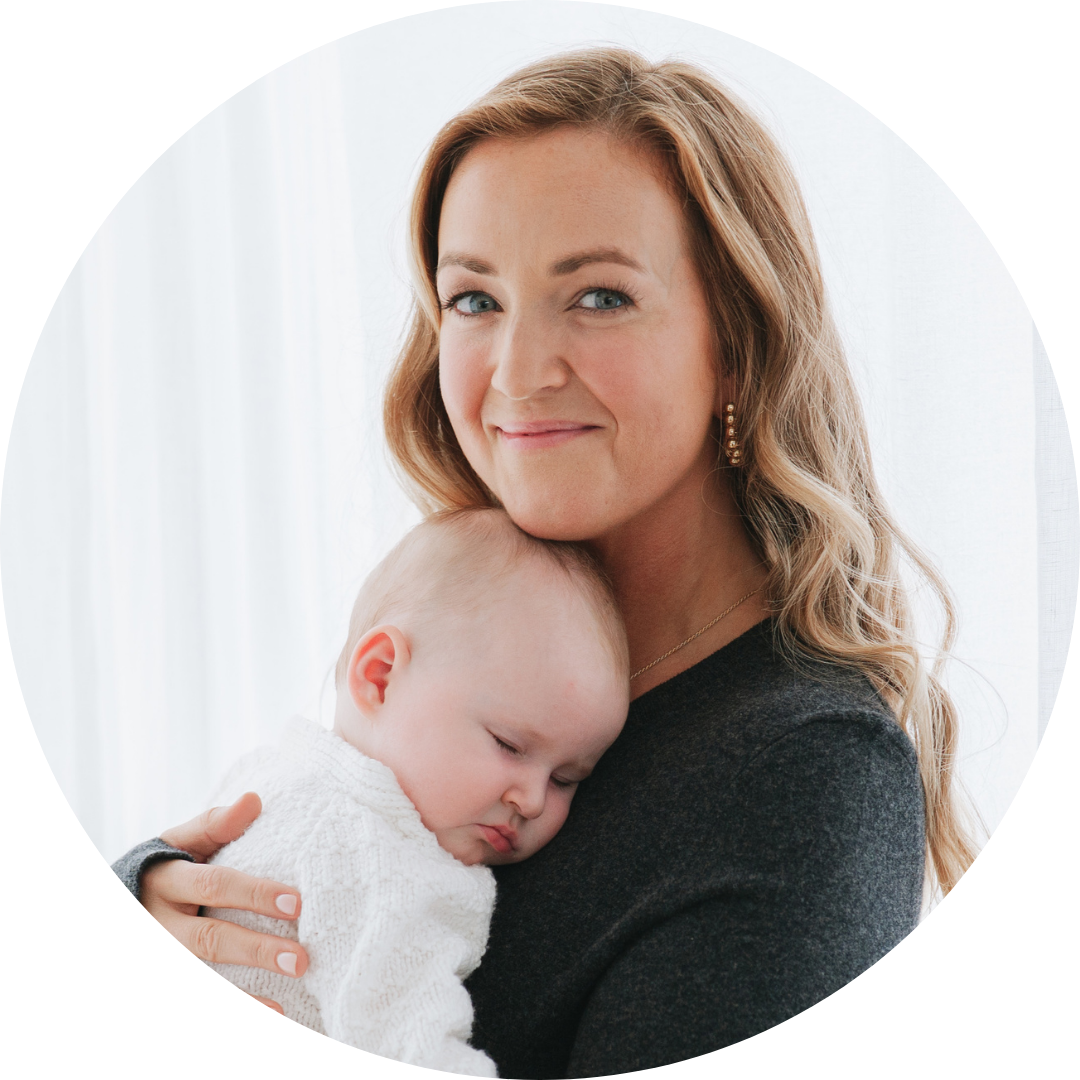My Top Tips for Newborn Sleep
The arrival of a newborn brings so much joy, however, there's no two ways about it - it's tough! As it's a time of sleepless nights, days and nights rolling into one, and therefore pretty exhausting for new parents. Understanding and supporting your newborn's sleep needs is so important for their growth, well-being and contentment.
In this blog, we'll provide you with our top tips for newborn sleep, enabling you to start to put great sleep foundations in from the beginning and establish healthy sleep patterns for your new baby.
1. Embrace newborn sleep patterns
Newborns have irregular sleep patterns with multiple short sleep cycles throughout the day and night. Accepting and working with these patterns will help you adjust your expectations and cope better with interrupted sleep at the beginning. Newborns sleep approximately 14-17 hours a day, often in short increments.
During the first 4 weeks, your baby will be sleeping most of the 24 hours in a day. This gives you a good opportunity during the day to simply rest and focus on your new baby. Whatever type of birth you had, you need time to recover both physically and emotionally. It's totally fine to stay in your bubble with your new baby and enjoy all the sleepy cuddles without worrying about sleep, routine, or getting into good habits right away.
Understanding sleep cycles can also help you make sense of your baby's sleep patterns. Babies spend about 50% of their sleeping time in what's known as "active sleep." This can look quite wakeful and can be noisy—they might be very snuffly and snorty, moving around in the crib, and even opening their eyes occasionally. It's common for parents to confuse active sleep with their babies waking during the night and then accidentally wake them by trying to intervene!
As a rule-of-thumb, unless your baby is crying, do not intervene. Just give your baby space, as often they are simply coming in and out of sleep cycles and will settle themselves back to sleep, which is what we want.
2. An optimal sleep environment
Creating a calm sleep environment really helps to promote better sleep for your newborn. Ensure the room is dimly lit, quiet, and at an optimal temperature (between 16-20°C or 61-68°F). Consider using continuous white, pink or brown noise to mimic the familiar sounds of the womb.
Swaddling your baby or using a swaddle sleeping bag also provides a sense of security and helps them to sleep more soundly in their crib or cot. This is particularly helpful for managing the Moro (startle) reflex, which causes babies' arms to flail and can wake them up. I recommend the Love To Dream "Swaddle Up" sleeping bags which are suitable from birth and are easy to use with a zip-up so you don't need to worry about how tight or loose you are swaddling.
Keep the crib or cot clear with a firm mattress—no loose pillows, bedding, or toys. This is primarily for your baby's safety but also helps them associate their sleep space with sleep and not play.
For overnight sleep, I recommend having no night lights or lamps left on. Instead, have the room pitch black with a night light you can tap on and off easily if needed during the night. Remember: babies are not born afraid of the dark at all. They are used to (and very comfortable with) a dark womb!
3. Follow a routine
Establishing a routine can help signal to your newborn that it's time to sleep. From around four weeks, if your baby has regained their birth weight, when their feeding is established and when you feel ready, you can start to follow a loose daytime routine.
Create a simple and predictable sequence of activities before bedtime, such as a warm bath, gentle massage, a feed, reading a bedtime story and a lullaby. Consistency will help your baby to recognise sleep cues and settle in a much more content way.
Starting your day at the same time each day and working to a 12-hour day (e.g., 7 am to 7 pm) helps set your baby's circadian rhythm. This also helps you plan naps, feeds, and eventually meals. One principle that is central to establishing good sleep is starting your day at the same time each day and working to a 12-hour day which will serve your baby for the first 2-3 years of their life and beyond.
The reason I suggest that 12 hour day and really being religious about starting your day at the same time each day is so that we can get enough feeds, play and daytime sleep in place during those 12 hours. When bedtime arrives, your baby will be nicely full from all milk feeds, and at the right level of "tired"—not overtired or under-tired—so we can start to expect some longer stretches of sleep at night.
4. Encourage daytime wakefulness
Helping your newborn distinguish between day and night is really helpful for establishing a healthy sleep-wake cycle. During the day, engage your baby in activities such as playtime on a playmat, exposure to natural light, and social interaction.
For daytime naps, it's fine for the environment to be brighter and noisier. At night, dim or turn off lights, close curtains and blinds, and make the environment darker and quieter. Use quieter voices and avoid turning lights on during night feeds.
By doing this for the first few weeks, you'll help your baby quickly learn to differentiate between day and night. Around 3-4 months, babies start producing the hormone Melatonin which puts their sleep cycles into a more regular rhythm. Melatonin is produced in the early evening, which is why we recommend your baby's bedtime happens somewhere between 6 pm – 8:30 pm—so that we can take advantage of nature's helping hand.
5. Feed and burp strategically
Feeding is hugely important for your newborn's sleep. Before you can start to make improvements to sleep, it's essential to make sure that feeding is well established:
• Aim for full feeds spaced out throughout the day (and night).
• Ensure your baby is taking full feeds and then able to go for a stretch of time between feeds.
For breastfeeding, be mindful about how long your baby has been feeding for (newborns can take up to 45 minutes for a full feed). If you see their feeding has turned to nuzzling and they are falling asleep, pop them off the breast and give them a little burp.
For bottle feeding, consider a "split feed" if they're only taking small amounts at a time—give them as much as they'd like, give them a burp and a break, then try again within 30-40 minutes.
Consider incorporating a dream feed, offering a feed right before you go to bed (somewhere between 10 pm and 11 pm), to help your baby (and you) to both be able to get a long stretch of sleep. This can be a game-changer for many families, though it doesn't work for everyone. If a dream feed isn't extending your baby's sleep, feel free to drop it and see when they naturally wake for their first night feed.
During the day, I recommend not letting your baby go for longer than three hours between feeds, even if that means waking them from a nap. This optimizes their daytime feeds and ensures they're taking everything they need during daylight hours.
6. Safe sleep practices
Creating a safe sleep environment in line with The Lullaby Trust's guidelines helps to reduce the risk of Sudden Infant Death Syndrome (SIDS). Place your newborn on their back to sleep, on a firm and flat surface, such as a crib or bassinet
Remove any loose bedding, pillows, or soft toys from the sleep area. Keep the room at a safe temperature and dress your baby appropriately. The Lullaby Trust recommends that all of your baby's sleeping should be done in the same room as you up to 6 months.
Once your baby has regained their birth weight, or unless told by a medical professional, there is no need to wake them every 3-4 hours for feeds at night. If they are willing and able to sleep for longer stretches, that's fantastic (enjoy!), and they should make up for it by starting to take larger feeds, which is exactly what we want.
7. Take shifts and accept available support
Sharing the night time responsibilities with your partner or a trusted family member can really help with sleep deprivation. One of you takes "the first shift" and one of you takes the second, allowing each of you to get some uninterrupted sleep.
For example, if one person handles the dream feed and any wakes until 2 am, then the other person can take over from 2 am until morning, you both get at least one longer stretch of sleep.
Reach out to friends, family, or support groups for support during this time. Don't be afraid to ask for help with holding the baby while you nap or assist with household tasks to allow you more rest.
Sleep deprivation is a form of torture for a reason—it's awful! It makes you cranky, breaks down relationships, sucks the energy and fun out of the day, and it's no way to live long-term. Getting your baby sleeping well and your daytimes to a more predictable place really helps to give back that feeling of normalcy and with it, a calm nervous system and a sense of peace.
8. Trust your instincts
Trust your instincts and you'll start to be able to tune into your baby's cues and signals more easily. Learn to recognize your baby's tired signs, which might include:
• Rubbing eyes or tired eyes
• Staring/zoning out
• Irritability or restlessness
Responding to these cues promptly, before your baby becomes overtired, can make settling them to sleep much easier. When babies are overtired, they produce cortisol (the "wake-up" hormone) which makes it harder for them to unwind, frustratingly when they need sleep the most! This can lead to babies fighting sleep, frequent night wakes, poor quality sleep, and early rising.
Following a routine with set timings can help you avoid the guesswork around when your baby is tired and ready for sleep.
Need a blueprint to follow?
Our Sleep Guides give you a step-by-step plan to follow to help your little one to become a great sleeper.
9. Introduce independent sleep skills
From as early as 4 weeks, you can gently introduce your baby to falling asleep independently. This isn't about "sleep training" but rather giving your baby practice at this important skill.
When starting to teach your baby how to settle themselves, simply giving them a bit of time when they start to make noise during the night or during a nap can make all the difference. If they are not crying, try to stay back and simply give them space to see if they will go back to sleep by themselves.
I love the saying with baby sleep: "Babies get used to what they are introduced to." So giving small bits of practice at settling in their crib is valuable.
Navigating newborn sleep can be a challenging journey for new parents. By embracing the advice in this blog, you can start to provide your newborn with great sleep foundations.
Remember that sleep is a skill that your baby will learn over time. Be patient, consistent, and trust that with gentle guidance, your baby will develop healthy sleep habits that benefit the whole family.








